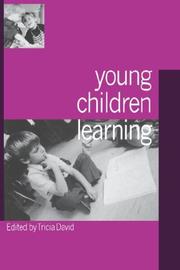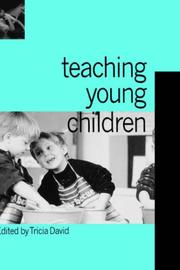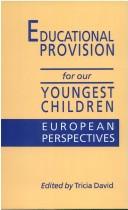| Listing 1 - 6 of 6 |
Sort by
|

ISBN: 1853963976 9781446266281 1446266281 9781446219416 1446219410 1853964409 9781853964404 9781853963971 1283880563 9781283880565 Year: 1999 Publisher: London : Thousand Oaks, CA : Paul Chapman ; SAGE,
Abstract | Keywords | Export | Availability | Bookmark
 Loading...
Loading...Choose an application
- Reference Manager
- EndNote
- RefWorks (Direct export to RefWorks)
Young Children Learning brings together the latest thinking on early intervention, children and stress, bilingualism, assessing children's learning, children making 'human sense' and children's spiritual development and religious education.
Cognition in children. --- Educational psychology. --- Education --- Psychology --- Cognition (Child psychology) --- Thought and thinking in children --- Child psychology --- Learning, Psychology of. --- Education, Elementary --- Learning --- Psychology of learning --- Educational psychology --- Comprehension --- Learning ability --- Psychological aspects

ISBN: 1853963968 9781446219409 1446219402 9781446265758 1446265757 1853964395 9781853964398 9781853963964 9781853963968 Year: 1999 Publisher: London : Paul Chapman,
Abstract | Keywords | Export | Availability | Bookmark
 Loading...
Loading...Choose an application
- Reference Manager
- EndNote
- RefWorks (Direct export to RefWorks)
Teaching Young Children brings together thinking and practice concerning young children's learning in a range of different curriculum areas - language, the arts, mathematics, physical education, information technology and science and geography.
Nursery schools --- Preschool teachers --- Early childhood education --- Preschool teaching. --- Early childhood education. --- Education --- Teaching
Book
ISBN: 1853964190 Year: 1998 Publisher: London Chapman
Abstract | Keywords | Export | Availability | Bookmark
 Loading...
Loading...Choose an application
- Reference Manager
- EndNote
- RefWorks (Direct export to RefWorks)

ISBN: 185396204X Year: 1993 Publisher: London Chapman
Abstract | Keywords | Export | Availability | Bookmark
 Loading...
Loading...Choose an application
- Reference Manager
- EndNote
- RefWorks (Direct export to RefWorks)
Book
ISBN: 9781138022812 9781315678979 9781317392781 Year: 2016 Publisher: London Routledge
Abstract | Keywords | Export | Availability | Bookmark
 Loading...
Loading...Choose an application
- Reference Manager
- EndNote
- RefWorks (Direct export to RefWorks)
Digital
ISBN: 9781138022812 9781315678979 9781317392781 Year: 2016 Publisher: London Routledge, Taylor and Francis Group
Abstract | Keywords | Export | Availability | Bookmark
 Loading...
Loading...Choose an application
- Reference Manager
- EndNote
- RefWorks (Direct export to RefWorks)
The Routledge Handbook of Philosophies and Theories of Early Childhood Education and Care brings together leading writers in the field to provide a much-needed, authoritative guide to the major philosophies and theories which have shaped approaches to Early Childhood Education and Care. Providing a detailed overview of key concepts, debates and practical challenges, the handbook combines theoretical acumen with specific examples to show how philosophies and theories have evolved over the centuries and their impact on policy and society. It examines the ways in which societies define and make sense of childhood and the factors that influence the development of philosophies about young children and their learning. The collection offers an insight into the key theorists and considers how the economics and politics of their time and personal ideology influenced their ideas about childhood. It looks at curricula and provision which have proved inspirational and how these have impacted on policy and practice in different parts of the world. The handbook also explores alternative and perhaps less familiar philosophies and ideas about babies and young children, their place in society and the ways in which it might be appropriate to educate them Bringing together specially commissioned pieces by a range of international authors, this handbook will enable academics, research students, practitioners and policy-makers to reflect on their own understandings and approaches, as well as the assumptions made in their own and other societies.
| Listing 1 - 6 of 6 |
Sort by
|

 Search
Search Feedback
Feedback About UniCat
About UniCat  Help
Help News
News